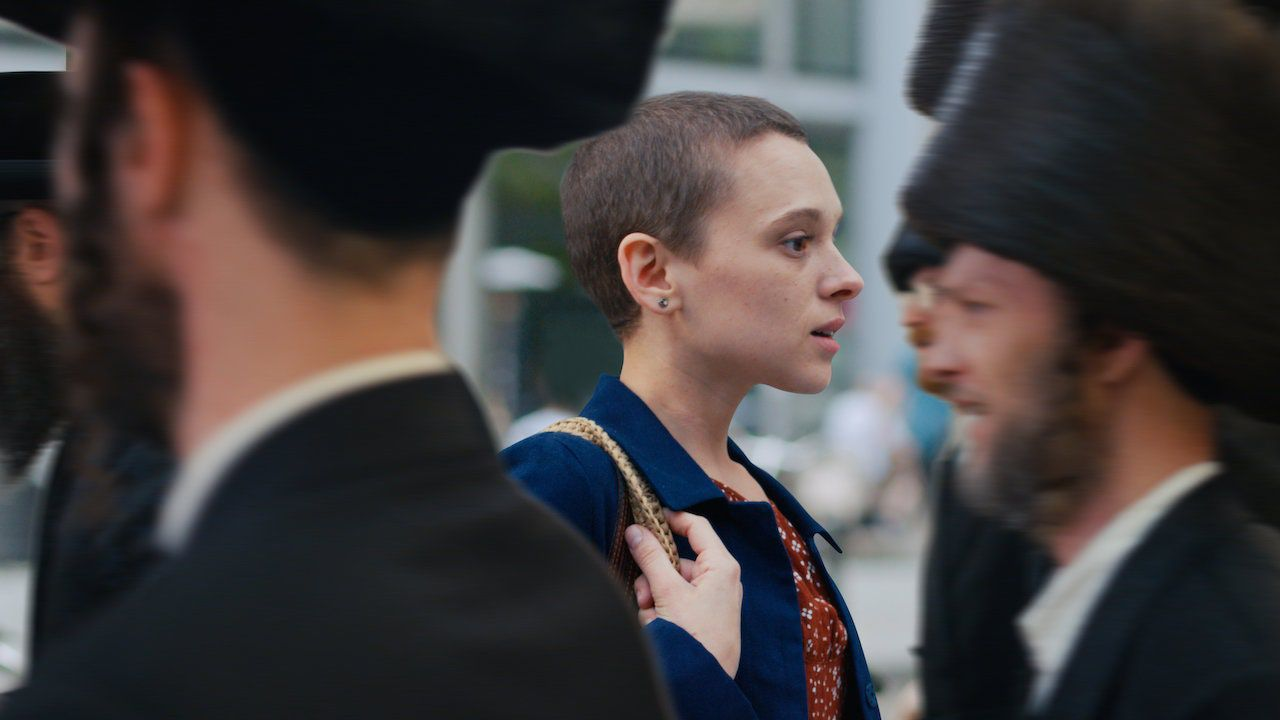Unorthodox and the Jewish Renaissance on Netflix

Courtesy of Netflix
By Francesca Faccani
The limited series Unorthodox is the most recent Netflix original production to have landed on our screens. Fragmented in four 1-hour long episodes, Unorthodox follows the escape of Esty, a 19-year-old woman and wife, from a life that constrains her in the Satmar community — an orthodox Jewish Hasidic group – in Brooklyn, N.Y. It’s unlike anything Netflix has ever produced, and yet it has already created a need for similar content, dictated by the desire to open the curtain of the orthodox Jewish culture.
Loosely based on the bestselling memoir by Deborah Feldman, one can recognize the complex narrative structure that characterizes a literary text in this series. Through a series of flashbacks, the show reconstructs the motivations that lead Esty, played by Israelian actress Shira Haas, to give up her place in the only micro-world that she knew for a future of uncertainty and precariousness. The narrative unfolds through two worlds, the claustrophobic past in the Hasidic community in Williamsburg, and the open present of self-discovery in Berlin.
In the beginning, Esty chooses Berlin as her newly elected city to track down her mother, who years before had also fled from the community. However, when she gets there, she is so overwhelmed by the newfound lack of restriction that she decides to venture on her own to write her very own narrative. Unorthodox is a refreshing vision as audiences get to witness a young girl discover freedom in the things for the first time that many of us take for granted. For instance, one of the first places that she visits as she arrives in Berlin is a fast-fashion store. In this scene, she tries on a pair of jeans and she is utterly surprised by the shape of her body. Through the flashbacks, we get to know the rules Esty had to observe in the Samar community. The highest status that a woman could aspire to is being a mother, the breeder of the husband’s children. She is told that women have to compensate for the lives lost in the Holocaust, an original flaw that the Satmar community trusts women to solve. That of becoming a bride and a mother is a process to become worthy. In other words, the woman has to pursue purification from her natural flaws, namely that of being a woman. We follow Esty take those steps: the shaving, the baths, the sex lessons. So when the viewers see Esty try on lipstick for the first time, attend an EDM concert, kiss a guy, they can’t help but cheer for her.
However, the chronicle of the events that take place in Berlin largely diverges from the memoir, whose conclusion is reached when Esty gets out of New York City. The difference is evident: the writing is more superficial and the plot is more sketched than properly developed. The reconstruction of life through flashbacks in the religious community is precise resulting in an emotionally powerful portrayal, whereas her story in Berlin is more flimsy and sometimes even trifling in comparison.
Esty spends her first night in Berlin on the floor of the National Conservatory, where, the day after, she mysteriously winds up attending classes and wanting to enroll in the program. There, she immediately befriends a group of musicians who take her around the city to try everything at once. These characters aren’t exactly convincing, however, they’re only rough edges of an overall beautifully written series. The series is successful because it doesn’t uniquely focus on the flight from the orthodox life, but takes to heart so many other aspects, like what it means to be young, to be a woman, and to look for one’s identity within and without one’s culture of origin. There will certainly be something for everyone to draw on. The choice of the female perspective to tell the story of a fundamentally chauvinistic sect turned out to be the keystone of a parallel and more accessible understanding of the culture.
The week following the release of Unorthodox, Netflix uploaded many more shows and films related to Judaism, with a focus on the stories of Jews who fled orthodox communities. For example, One of Us is a documentary feature film from 2017 that chronicles the lives of three former Hasidic Jews from Brooklyn.
The only way to learn about these closed communities from the outside is through the words and stories of those who left, and the visive medium seems to be the most incisive way to recount them.
However, these stories of former Hasidic Jews are not the only ones with popular demand. Shitsel is an Israelian TV show that follows the collapse and the consequential coming together of a Jewish family that lives in Jerusalem. The Awakening of Motti Wolkenbruch is a 2018 Swiss comedy about an orthodox Jewish boy that falls in love with a goy, meeting his mother’s disapproval. Little is known of the world of the orthodox Jews, but thankfully the series Unorthodox provides audiences with the perfect key to the way in.








